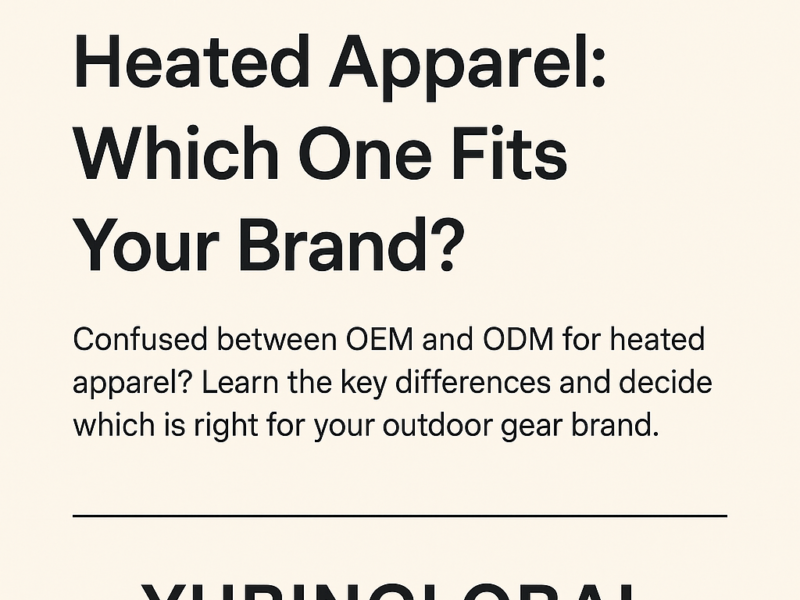
If you’re planning to launch a heated apparel line—whether it’s vests, jackets, or base layers—one of the first questions you’ll face is: Should I go OEM or ODM? While these two models are often used interchangeably, they are not the same. And choosing the right one for your business model could make or break your product launch.
In this article, we break down the real-world difference between OEM and ODM manufacturing in the heated gear industry, and how to choose the best fit for your brand.
🔍 What’s the Difference Between OEM and ODM?
Let’s start with clear definitions:
- OEM (Original Equipment Manufacturer):
You bring the product idea or specifications. The manufacturer produces based on your design, branding, and components. Full customization is involved. - ODM (Original Design Manufacturer):
The factory owns the core product design. You apply your branding or request small modifications. Faster and cheaper to launch, but with limited flexibility.
📌 Example:
- Want a unique heated vest with your chosen insulation, battery system, stitching pattern, and materials? → OEM
- Want a ready-made heated vest with your logo on the tag? → ODM
⚙️ OEM heated gear: Full Control, More Responsibility
OEM is ideal for brands that want product differentiation and have a clear technical or aesthetic requirement. You’re not just putting your logo on a product—you’re building one from scratch or with major customization.
✅ Pros of OEM:
- Full product design ownership
- Ideal for patented/unique selling features
- Better brand positioning and pricing control
- Freedom to choose materials, battery system, heating zones, certification path
❗️Challenges:
- Longer lead times (sampling, prototyping, compliance testing)
- Higher MOQs (typically 300–500 pcs minimum per SKU)
- Requires deeper collaboration and clear communication
🧩 ODM Heated Apparel: Faster Time-to-Market, Lower Risk
ODM is perfect if you’re looking to enter the market quickly with tried-and-tested products. This route is popular for first-time buyers or promotional lines where uniqueness isn’t a top priority.
✅ Pros of ODM:
- Fast turnaround time (some styles ready in 15–30 days)
- Lower MOQ (as few as 100 pcs)
- Proven performance and fewer development headaches
- Reliable thermal systems already optimized by factory R&D
❗️Limitations:
- Less room for design differentiation
- Difficult to secure exclusivity
- May overlap with other brands using the same base model
🧪 Choosing Based on Your Business Type
| Business Type | Recommended Model |
| Startup testing heated apparel | ODM |
| Sports/outdoor brand with loyal base | OEM |
| Private label dropshipping project | ODM |
| High-end technical outdoor line | OEM |
| Promotional giveaways | ODM |
| Seeking long-term exclusivity | OEM |
🔍 Case Study: A Mid-Sized Brand Scaling with OEM
A Canadian winterwear company came to us looking for a heatable softshell jacket that could pass CSA safety testing. They needed:
- Extended heating time (>8 hours)
- Custom panel design to highlight branding
- Removable battery pack with UL-listed adapter
An off-the-shelf ODM design couldn’t meet their needs. Through our OEM solution, we delivered:
- Custom 3-zone carbon fiber heating
- Branded reflective trims
- CSA + UL compliant components
- Delivered 3,000 pcs over 2 seasons
Today, it’s their best-performing winter product line.
🛠️ Key OEM vs ODM Checklist
| Feature | OEM | ODM |
| Product Customization | ✔️ Full control | ⚠️ Limited (color/logo only) |
| Time to Market | 2–5 months | 2–5 weeks |
| MOQ | Medium to high | Low |
| Ideal For | Differentiated brands | Market testers, early-stage brands |
| Unit Cost | Higher upfront, lower per unit | Lower upfront, slightly higher unit |
📦 How We Support Both Paths at YubinGlobal
Whether you go OEM or ODM, YubinGlobal supports both tracks with:
- In-house R&D for heating systems
- Dedicated account managers
- Battery safety compliance (UN38.3, UL, CE)
- Packaging design and private labeling
- Flexible MOQ support on pilot runs
💬 Not sure which model fits your case? We’re happy to offer a quick consultation. Email us at sales@yubinglobal.com.
✅ Final Thoughts
OEM and ODM are both powerful tools—when used right. If you have a strong product vision and want long-term brand equity, OEM is the way to go. But if you’re testing a market or working with a limited budget and timeline, ODM can deliver real results fast.
At YubinGlobal, we help brands grow on both paths. Whether you need 100 units with your label or 10,000 custom-engineered jackets, we’re your trusted heated apparel partner.

Recent Comments